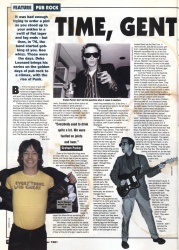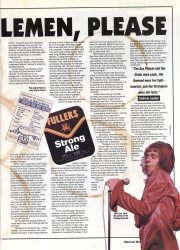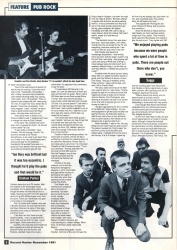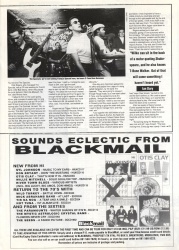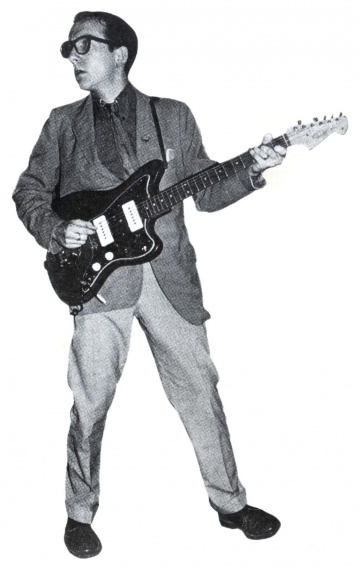|
By '76 the first wave of pub rock bands had either broken up or moved on to bigger things. Dr Feelgood were conquering America and apart from Graham Parker and the Rumour and Rockpile, there was little attracting press or record company interest.
Parker and the Rumour were already moving on to bigger venues like the Rainbow and Hammersmith Odeon. "I loved the big places," says Parker, "because I'd always had an incredible problem with monitor systems in the pubs. I hadn't had the background of playing different kinds of places like the Rumour had. My singing style was pretty much go out there and scream at the fuckers. Ram it down their throats. For some reason I was angry and for some reason, whether it was all the things they'd been through in their time, The Rumour were all energy and anger. It was a bit nasty. Everybody used to drink quite a lot. We were fuelled on joints and beer. I couldn't get stoned and do a gig now but in those days you were supposed to. It was just part of it. I haven't reformed; I just don't have a drink before I sing now. I'm half-reformed. Once a week I eat brown rice and vegetables."
Down at the Nashville things were turning a little sour. To supply the pub with bands, Dai Davies had formed an agency called Savage Aries, with Derek Savage, an old friend and business associate, and was soon representing Meal Ticket, Frankie Miller, Deaf School and the Flaming Groovies. They built a circuit within a circuit and began bringing in out-of-town bands in for a week or so.
However, the Nashville was a Fullers' pub and Fullers were not happy. They were footing the bill and began to regard the Nashville as something of a fiscal black hole, and the large crowds as a collection of potential trouble-makers.
"We always made sure that the bands had a good time," says Davies, "but Fullers didn't see it that way. I had to force it onto the contract that bands had to have a crate of beer at the end of a gig. It seems such a small thing nowadays but, at the time, it was a very generous gesture, but all these things I had to fight for."
The constant battle was tiresome and Davies, who hadn't handled a band since the demise of Ducks Deluxe and Brinsley Schwarz, toyed with moving back into management. A year or so earlier he had, by chance, seen a band called the Stranglers.
"I thought they were interesting but really bad," says Davies. "They hadn't got it together as a live band. They came into the agency a few weeks later and we said, 'You need to improve a bit musically. Go away and do every gig you can for a year or so.' And that's what they did. Nine months later they rang up and said they'd done all these gigs and they'd had a couple of line-up changes and they were much better. We went to see them again. I thought they were a cross between the Velvet Underground and the Doors. I thought of it as almost the psychedelic revival arrived early. We signed them to the agency, put them round the circuit, and, eventually, we started to manage them."
One day Malcolm McLaren rang up Davies and invited him to come and see his new band, the Sex Pistols. "They were playing at what must have been the first warehouse party, down in the docks somewhere," recalls Davies. I went, and they were great. I just thought I was seeing an English band that was copying Iggy and the Stooges. I'd been heavily involved with Iggy in the past as his publicist and, on the strength of that, I booked them into the Red Cow, in Hammersmith, and did the process with them, graduating them to the Nashville. Malcolm has written this out of the Sex Pistols' history. He prefers the notion that no venue would take the risk of putting them on, but we put them on in all our venues. Malcolm has always been a very personable, nice guy. It's only in the press he pretends to be sinister. He used to come quite regularly to Brinsley Schwarz gigs; probably not a thing he'd admit to."
"I put the Pistols on at the Nashville with the 101ers as a double bill," says Davies. "They did about eight or nine weeks. Nothing outrageous happened. Loads of people came to see them. They were a younger crowd than usual and a little more boisterous, but nothing special. Ordinary kids would come in once or twice and the next week they'd come in with a funny haircut, because they'd decided to go for it. One girl used to come and see Graham Parker. She was about nineteen, obviously well off, and dressed in smart clothes, and she turned into a punk over the eight weeks that the Pistols were there. The smart clothes went, she bought a motor-bike, and her accent switched down to Fulham. She seemed fairly typical.
"There was no trouble until the very last week," remembers Davies. "They staged a rather phoney fight and there was a journalist there to take a photo of it. It wasn't a real fight. We'd had much worse than that. Drag nights were worse than that. Brian, the doorman, who was the best at his job I've ever seen, didn't even notice it. But when it was in the papers, Fullers rang me up, completely outraged. The papers had rung them up and they said, 'We're certainly not having them back, or any bands like them'. The papers rang me and I said, 'It was nothing. They can play here any time they like.' We carried on putting punk bands on, but we had to pretend they weren't punk bands. We had to pretend that the Damned weren't punk. It was certainly a myth that the Sex Pistols were banned from every venue in London. They progressed quite normally through the Fullers' chain. It was their last night at the Nashville, not because of the fight, but because we could not longer afford to book them. They were too big."
The Sex Pistols, however, didn't get past the door at the Hope & Anchor. They sent down their representative, Bernie Rhodes, to fix up a gig. "He was a little turd," says John Eichler, the landlord. "He laid this really obnoxious trip on us about how the Sex Pistols were going to be the next big thing, so I physically threw him out."
Eichler had just taken over the Hope after the previous landlord, Fred Grainger, a dedicated hedonist, had quit to pursue his grandiose dreams.
Eichler was an old colleague of both Dai Davies and Dave Robinson of Stiff Records. He had been one of the protagonists in the Brinsley Schwarz hype' and went on to manage Help Yourself, a United Artists' band who were a refuge for several wayward Ducks Deluxers, and was a member of what was fondly referred to as the UA Mafia who treated Andrew Lauder's A&R office as their own, while Lauder looked on benignly.
Eichler went to see Davies and Savage and together they decided to take over the tenancy of the Hope. Davies and Savage provided the money and Eichler proceeded to rtaVffie pub as he damned well pleased. It's alrbaOy formidable reputation was enhanced by an idiosyncratic booking policy (bands were booked for the most whimsical of reasons), a colourful staff (space cadets and out-of-work actors), and an open-house policy that made the pub the last stop for musicians who had run out of places in which to lig and needed somewhere to crash. Rat Scabies, of the Damned, spent many a night there.
"The Captain and I would go out and, when everywhere else had shut down, it was, 'Let's go down the Hope,' says Scabies. "There was a big room with beds in it. It was like a dormitory for well-dodgy musicians. I remember Jean-Jaques Burnell waking up one morning and doing his karate exercises, and we were all going, 'Aw, fuck off, Burnell'."
For The Damned, getting on the pub circuit wasn't easy, even if they got past the front door.
"We played the Nashville once," recalls Scabies, "and they banned us. We never played there again. It was strange because we used to drink in there, but they wouldn't let us on the stage. The Pistols played there a few times and I think it had upset their customers. Tuesday was Punk night. They were trying to keep that one-night-a-week thing. Monday would be Country & Western, Tuesday would be Punk, and Wednesday would be a stripper, or whatever. They used to try and do that everywhere. We played at the Red Cow once and they said, 'No, never again.' I think the audience was quite a lot of trouble for them. Dire Straits, for example, were there for years doing that circuit, and everybody used to sit there and drink their beer and watch them, and it was all very civilised. Then, suddenly, there were all these little hooligans going, 'Waurrgh!' There were all these little oiks down the front, looking very strange. People were getting up and dancing and I don't think they'd seen that for a few years. And there'd be loads of broken glasses."
"Also there was quite a lot of destruction and chaos going on, and on the stage. We were saying, 'It doesn't matter if you boo or throw glasses at us because that's better than taking it calmly. We're not here for that. We are here to incite."
"We did a Punk Festival in Mont-de-Massant, down in the south of France, and Eddie and the Hot Rods and us were the only two bands that vaguely resembled Punk. The rest were all the old hippies. That's where we met Nick Lowe, Sean Tyla, and all that lot. And that's where we met Jake Riviera. We'd heard about Jake through Nick Kent, the NME journalist, who said that he was an on-the-case bloke, who had just started a small record company called Stiff, and he was worth meeting. He was on the case and he did have the right attitude to work with us, so it just fell into place."
Once in the Stiff stable, Riviera and Robinson, far from curtailing the band's excessive behaviour, goaded them on.
"They encouraged us every step of the way," says Scabies. "You wanna smash the drums up, Rat? Go on then. Kick the fucking shit out of them. I'd say, 'Dave, can I set fire to my drums?' and he'd say, 'Use my lighter, Rat.' I think you have to admire Robinson for his gall and his cheek. I don't know how much he's done me for, but I know it's a few quid. Bastard! How he can live in a quarter of a million quid house a quarter of a mile from my two-bedroomed flat, I'll never know. Still..."
With Robinson directing, they shot the "New Rose" video at the Hope & Anchor. "That was one of the first group videos," says Scabies. "I think Jake actually realised that that was the way it was going to go, smart-ass git. And it was cheap, as well as being a new angle, which Mr Robinson was always looking for."
The Hope & Anchor was also the site of one of the Damned's more memorable gigs. "We did it the night after we got kicked off the Anarchy Tour," says Scabies. "Everybody was really fed up because of all the business that was going on with the press, and just to go down and play the Hope again was great. Loads of people turned up."
Charles Shaar Murray, the NME journalist, who himself played the pubs as his alter-ego, Blast Furnace and the Heatwaves, was there. 'They wanted a place to play because it was the only way they could explain to their audience what was going on, so the pubs were part of the life-support system at that point."
It was quite a social occasion. "Chrissie Hynde and Sid Vicious were there," remembers Murray. "At the time Chrissie was in danger of getting slung out of the country and had to marry somebody in a hurry, and Sid had volunteered. Chrissie can count herself extremely lucky that she managed to get her visa sorted out in some other way."
Dai Davies, meanwhile, was trying to sell the Stranglers to United Artists but Andrew Lauder, the head of A&R, was unimpressed.
"Dai gave me a hard time and wouldn't take no for an answer." says Lauder. "He kept bringing in tapes which sounded a bit like the Doors, but, having been to Damned gigs, it didn't seem quite the same idea at all. Dai made me go and see them about six times and I'd keep saying, 'Dai, I don't really see it.' At the time, everybody was trying to decide who was punk and who wasn't. The Sex Pistols and the Clash were punk, the Damned were too light-hearted, and the Stranglers were old farts. In the end it was so damned catchy we went and did it."
"Their gigs were fun," recalls Lauder. "It was all 'Punkrock-Shock-Horror-Stop Show!' That was good for them because their first album appeared at number four in the charts, and everybody fell over. It came out about a week after the Clash album, which had gone in at number twelve, and everybody at CBS was feeling very smug until the Stranglers went in at four, and it was, 'What scam have you pulled here? The bugger is selling!' Nobody was more surprised than UA Records."
The initial reluctance of landlords to book punk acts was overcome when they saw the profits being made by those pubs who did. There was also a growing realisation that, while punks were noisy and boisterous, they were not, with a few notable exceptions, a bunch of psycho-paths. The flood-gates opened and soon the circuit was home to bands such as Siouxie and the Banshees, the Jam, the Vibrators, the Buzzcocks and 999. But although punk was everywhere, there were other things happening.
The night Elvis Presley died, Jake Riviera and Nick Lowe were having a drink in the Hope & Anchor. Riviera had just signed Elvis Costello to Stiff, and Costello's first record was attracting attention. The news of Presley's death devastated Lowe.
"Due to the vast amount of alcohol I'd had during the evening, I burst into tears," says Lowe. "Completely inconsolable, I was. Initially, everyone was sympathetic. Jake started off being really nice, saying, 'Calm down, man. It'll be alright.' Then he started to get snappy with me. I was going, Oh man, if it wasn't for Elvis, there'd be no Beatles. There'd be no anybody.' Then Jake snapped. 'Listen,' he said, 'he hasn't made a good fucking record for fifteen years. Just pipe down and shut up!'"
They drove home in silence until Riviera suddenly said, "I suppose we'll have to change his name to Elton Costello."
In the early '70s, Costello had come down from Liverpool to London. He formed a band called Flip City.
"It was really a shambles," says Costello. We did one gig a month. The drummer worked at the Fender Soundhouse, so we used to go down there on a Friday in our van, which barely went, and borrow gear for the weekend. Everybody that worked there was in a group so if you weren't there by four-thirty, you ended up doing the gig with two Carlsbro bass-bins as a PA system. Matt, the landlord at the Kensington hated everybody, but he particularly hated us. He thought we were rich kids that did it for a hobby, because we didn't do many gigs and we'd turn up with different gear every time we came. There can't have been any gear in that shop on the weekend."
Flip City folded and Costello, who was a Brinsley Schwarz fan and had met them and Dave Robinson at some of their gigs, recorded some songs at Robinson's Hope & Anchor studio.
"I did about an hour there one day," recalls Costello, "and I just played every song I had, and put them on tape. I never saw it again. God knows what's on it."
Costello, who was playing the Nashville fairly regularly as a solo act opening for Graham Parker and the Rumour and Rockpile, decided it was time to get a record deal. His approach was unorthodox, to say the least.
"I'd read about Stiff Records in the paper, so I took the afternoon off work and went up there with my guitar. When I got to Stiff there was no-one there except Bruce Thomas' wife, who was the secretary. I knew it was a small operation but I thought, 'Oh God, is it just one person?' I left them a tape but, as I was leaving, I bumped into Nick Lowe. I had a guitar strapped to me so he could hardly miss me. I said that I'd just left a tape and, about a month later, we made the first record."
"The record was done really quickly," says Costello, "and you can hear things that are carried over from pub rock. Punk records were coming out and this was making me think, 'Oh, nobody's going to listen to my songs. They're too nice and they're too knowing.'"
Costello's fears proved groundless, the record was a success, and he set about auditioning musicians for a backing band, to be called the Attractions. Riviera had his own ideas about a drummer. He introduced Costello to Pete Thomas and said, 'This is your drummer." Thomas had been the drummer of Chilli Willi and the Red Hot Peppers, one of thee original pub bands and the first band that Riviera had managed.
Costello's rise was meteoric, but he and the Attractions managed to squeeze in some memorable pub gigs before moving on, particularly two nights in the Nashville, when their opening act was a band called Dire Straits.
Dire Straits, who seemed to be unfashionable to the point of perversity, had been going around the pub circuit, virtually unnoticed. Mark Knopfler had come down from Newcastle and immediately joined Brewer's Droop, a pub band on its last legs. After a couple of months the band folded and Knopfler, who had a degree in English Literature, got a job teaching at a London college. While there, he formed a band called Cafe Racers.
"We started doing pubs," recalls Knopfler, "and one of the very first was the King's Head in Islington, just down the road from the Hope & Anchor. We were offered a regular spot and soon we were packing them in. It was summertime and they'd be out on the street as well, looking through the big, glass windows. We played Rockabilly and R&B. We used to dig up really obscure thing that nobody had heard before, mostly Sun and Mercury Rockabilly."
"The standard money then was about forty quid," says bass-player, John Illsley, "and by the time you'd paid for the PA and everything, there was nothing left. If we came out with ten quid, then it was OK."
But Knopfler was becoming increasingly dissatisfied. "I was writing more and more and the singer couldn't sing the stuff that I was doing. I was playing with a pick and doing a Wilko style of .thing; a cross between jabs and chord stuff, but it needed a different thing. I just felt that my stuff was different. It needed two guitars for a start."
Knopfler broke the band up and, taking Illsley with him, added his brother David on guitar and Pick Withers on drums, to form Dire Straits. They got a residency at the Hope & Anchor, made a demo-tape, and sent it off to Charlie Gillett.
"He had a radio show that all the A&R men used to listen to," says Illsley. "Charlie played the tape on his show and once that happened we got an awful lot of interest. Johnnie Staines, from Phonogram, was listening to the show. He was in the shower at the time and he actually got out of the shower to listen to it."
"We got a gig opening for Elvis Costello at the Nashville," says Knopfler, "and we were supposed to get ten quid and after the gig Paul Conroy, the bloke who paid us, said he only had a fiver on him and we'd have to come round to their offices on the following day to get the other fiver."
Illsley exploded. "I said to him, 'Are you telling me you haven't got ten quid on you? The place is packed for Christ's sake!' He told me to come round the office and walked away. I followed him and we had a real Barney. In a fit of temper I ripped up the fiver that we already had, and threw it at him, and everybody said, 'You fucking idiot!' He still owes me a fiver."
They signed with Phonogram and when "Sultans Of Swing" was a success, they moved on.
Since the demise of Kilburn and the High Roads, Ian Dury had been writing songs with Chas Jankel. They formed a band called the Blockheads and started to play the pub circuit. They signed with Stiff and the resulting album was New Boots And Panties, a highly original body of work. Wilko Johnson, who had long since left Dr Feelgood, played on two tracks.
"Wilko's sound is so strong, and his determination is so there, that he dominates a track to the extent of almost obliterating it, so we were both very quirky."
Even though New Boots And Panties catapulted Dury into national prominence, he continued to play the occasional pub gig, and eventually Johnson became a fully-fledged Blockhead.
As the Punk tide began to ebb, the pub circuit fragmented into a myriad of musical styles. Although it lacked the frenzied excitement of the Punk period, it proved to be a particularly rich time. Audiences were spoilt for choice and could take their pick from a dazzling array of bands that included Squeeze, The Pretenders, Joe Jackson, Dexy's Midnight Runners, The Police, The
|
